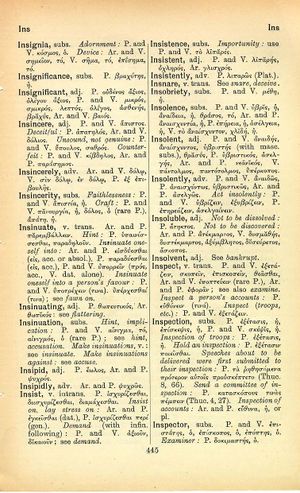insinuate: Difference between revisions
From LSJ
εἰ δὲ τύχῃ τις ἔρδων, μελίφρον' αἰτίαν ῥοαῖσι Μοισᾶν ἐνέβαλε → if someone is successful in his deeds, he casts a cause for sweet thoughts into the streams of the Muses
(Woodhouse 3) |
(CSV4) |
||
| Line 1: | Line 1: | ||
{{ | {{Woodhouse1 | ||
| | |Text=[[File:woodhouse_445.jpg|thumb|link={{filepath:woodhouse_445.jpg}}]]'''v. trans.''' | ||
Ar. and P. παρεμβάλλειν. | |||
<b class="b2">Hint</b>: P. ὑπαινίσσεσθαι, παραδηλοῦν. | |||
<b class="b2">Insinuate oneself into</b>: Ar. and P. εἰσδύεσθαι (εἰς. acc. or absol.). P. παραδύεσθαι (εἰς, acc.), P. and V. ὑπορρεῖν ([[πρός]], acc., V. dat. alone). | |||
<b class="b2">Insinuate oneself into a person's favour</b>: P. and V. ὑποτρέχειν (τινα). ὑπέρχεσθαί (τινα); see [[fawn on]]. | |||
}} | }} | ||
Revision as of 09:44, 21 July 2017
English > Greek (Woodhouse)
v. trans.
Ar. and P. παρεμβάλλειν. Hint: P. ὑπαινίσσεσθαι, παραδηλοῦν. Insinuate oneself into: Ar. and P. εἰσδύεσθαι (εἰς. acc. or absol.). P. παραδύεσθαι (εἰς, acc.), P. and V. ὑπορρεῖν (πρός, acc., V. dat. alone). Insinuate oneself into a person's favour: P. and V. ὑποτρέχειν (τινα). ὑπέρχεσθαί (τινα); see fawn on.

